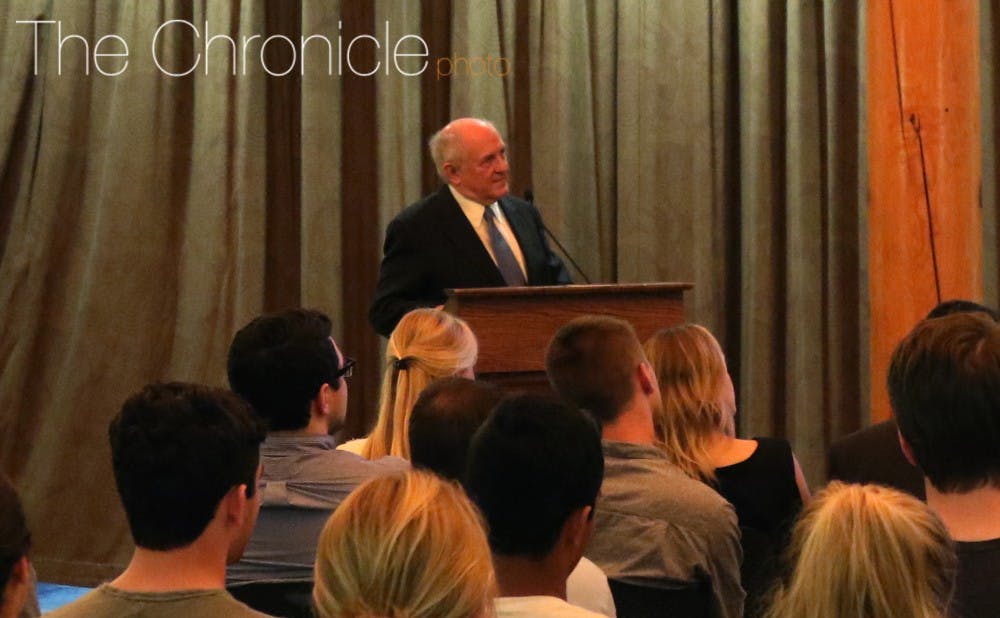Security was tight at a talk by Charles Murray, the libertarian social scientist who co-authored the 1994 book "The Bell Curve," which some have criticized for having eugenic undertones.
Early this month, protesters shouted down Murray at a similar talk at Middlebury College. But Duke took no chances. Student IDs and tickets were checked three times before the event. Private security guards lined the perimeter of the Doris Duke Center at the Sarah P. Duke Gardens, in addition to the police stationed at the event. Approximately 50 people—mostly students—were in attendance. According to the event's Facebook page, tickets were only available for the first 75 students or faculty.
"I’m pleased to see you all sitting out there, facing me,” Murray began, alluding to the Middlebury incident in which students stood with their backs to Murray before eventually attacking his car as he left campus.
Murray’s talk highlighted the increasing polarization of working class and upper-class white people, which he and professor of political science Michael Munger—who introduced Murray—suggested as a factor in Donald Trump's presidential win last November.
He argued that upper-class people live in “the bubble” and has developed a quiz that scores people on how disconnected they are with working-class America. For example, some questions ask respondents whether they have been to a factory or seen certain common movies.
“You are living a life that is in a bubble," Murray said. "And I go through all of this not to indict you—there’s nothing wrong with being around people who share your taste and preference. It’s important in many ways to want those common bonds, but the problem is it leads to condescension and disdain and sometimes it leads to contempt. That’s where a lot of anger comes from during the election. When they hear the term flyover country, they know exactly what is described."
Murray argued in favor of an "American Creed," which he described as freedom, individualism and egalitarianism. He added that this has been disappearing since the 1960s, partially as a result of class polarization.
“The proportion of Americans who choose to embrace the American Creed in its original form is a very small minority. I don’t see us reversing that, absent of some events that I can’t even imagine," Murray said. "I think we are in a situation now, which some of you will think is good and others of you will think less so, where the United States will be, in 15 or 20 years, essentially indistinguishable from the advanced democracies of Western Europe. This is not the most horrible of all things... But something will have been lost.”
One way to maintain America's unique character, Murray said, was for highly-educated people to avoid metropolitan areas. Instead, he said, they should consider living in smaller towns.
"Don’t choose to live in the Research Triangle...or the Upper East Side," Murray said, addressing the audience. "And if you love America, maybe this is a new way for you to prove it."
Murray took several friendly questions from the audience following the talk about his policy positions and advice for conservative students on campus.
To the latter, Murray replied, “Don’t talk politics. I’m serious. I have great friends from the left…and we get along great, as long as we don’t talk politics, and as long as I explicitly say when politics come up, 'There’s no point in talking about this. I’m never going to change your mind.'”
Darren Beattie, an instructor of political science, introduced himself to Murray as the only faculty member who had endorsed Trump and predicted his win, before disagreeing with Murray about his point that higher education has little value. Other faculty and administrators in attendance included Sue Wasiolek, associate vice president for student affairs and dean of students, and Michael Schoenfeld, vice president for public affairs and government relations.
Colin Duffy, president of the Duke College Republicans, which co-sponsored the talk, said he thought the lack of confrontation at the event was indicative of Duke's culture.
"I think we were all very happy with how this event went," he said. "I'm very proud of Duke in the sense that it was a very civil, frank discussion."
Murray seemed pleased that the talk had not been interrupted, saying that he had a “much better time tonight” than at Middlebury. However, there were four protesters across the street from Duke Gardens with vuvuzelas and air horns, though they could not be heard inside the Doris Duke Center during the talk.
Get The Chronicle straight to your inbox
Signup for our weekly newsletter. Cancel at any time.

